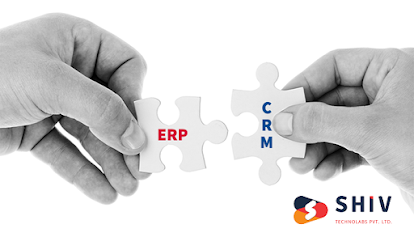What is the Difference between an ERP and a CRM?

Table of Contents
What is the CRM system?
CRM systems are designed to record & store the data & information regarding customer interactions, here your data will be standardized & easily shareable throughout the organization.
With the help of the right CRM system, organizations can easily manage & segment every single aspect of the customer experience. However, it also can create sales projections and nurture the prospect through the sales funnel, can manage invoice, communication & more.
Generally, CRM improves efficiency, increases sales, and offers more accuracy with customer data. As a result, customer relations are enhanced.
Here are several features you can execute with a CRM system
- Analyze purchasing patterns.
- Automate redundant tasks.
- Streamline the sales process.
- Benefits of CRM Systems.
- Identify new leads.
- Offer high-quality customer support.
- Automate and manage marketing campaigns.
Benefits of CRM Systems
CRM system access 360-degree views of current & target customers. It allows you to build customer groups, lists based on marketing profiles. Here, you can create more targeted, more informed digital campaigns. Through the CRM system, you can launch campaigns on strategic platforms such as websites, social media & email to capture leads where they are review campaign metrics using cohesive, department agnostic platforms. CRM system manages multiple campaigns at once like serialized email campaigns, landing page redirects, social media ads, special sales, promotions, and more sent to customers based on their exact spot in the sales funnel.
What is the ERP system?
ERP software is designed to streamline business operations. Whereas a CRM focuses on the sales side of the organization, an ERP system is integrated & implemented across multiple departments. ERP system offers you the interconnected management of specific business processes. You can get standardized information from all departments in real-time. Any issues sent as alerts to designated recipients.
Here, businesses can focus more on data & less on operations. There are fewer errors, & firms can make better decisions.
Features you can utilize with an ERP system
- Process orders
- Get alerts about issues
- Track manufacturing and supply chains
- Create enterprise-wide strategies
- Update accounts
- Manage hiring initiatives
- Enter business process information in real-time
- Manage benefits, payroll and employee information
Benefits of CRM Systems
Through the ERP system, integrate initiatives from strategic planning, marketing, sales, supply chain, accounting, & many more has become easy. Previously it was very time consuming to perform processes like login, passwords, access only securities systems is now bound in one spot for all to use. This means you won’t have to waste time copying, pasting, or manually re-entering information from one file or program to another — the ERP system’s custom rules and specs automatically do this for you.
Here, you don’t have to waste time in copy-paste or manually putting the information from one file to another, because the ERP system’s custom rules & specs automatically do this for you. ERP eliminates redundant manual back-office computer tasks & saves your time and money ultimately. Your program workflows, inventory orders, payments, notices, and more to initiate automatically from the digital system, then tweak and tailor these activities as you go.

Top Important Differences Between CRM and ERP
Type Of Company
Following the logic of the points above, if an ERP costs more to implement in terms of time, resources and money, it’s obvious that medium and larger sized companies are the ones that will benefit more from this type of software, since many SMEs and micro-enterprises often lack the necessary resources. The departmental structure of smaller businesses that have fewer employees is a lot simpler, meaning they probably don’t need to implement an ERP since these are designed to centralize the activity of larger companies.
Ease Of Implementation
Given that more than one department works from the ERP, implementing it can prove a little costlier and time-consuming than implementing a CRM. It’s a single system that has to be used and learned by all employees who might have varying levels of IT knowledge and different methods of learning.
Ease Of Data Migration
Another aspect not so often talked about is the ease of data migration from other software solutions previously installed in the company.
Since CRM is a more specific tool, transferring client data to a CRM is much easier than transferring all company information (payments, invoices, deliveries, delivery notes, etc.) as is the case with an ERP.
Costs
The investment that has to be made by a company when choosing between one software and another is another differentiating factor. It makes sense that if it takes longer to implement the software and there are many user licenses to add, the cost of an ERP will be considerably higher than that of a CRM. You can simply reduce your cost with Hire ERP & CRM Developers who knows how to work with both software in an expert way.
End Goal
While a CRM centralizes, simplifies and optimizes the sales process, an ERP manages various areas of the business processes to improve productivity. CRM usually focuses on the sales department (and in some cases marketing too), while an ERP operates on an interdepartmental level.
Summing-Up
If you’re trying to decide whether ERP and CRM Software Development Services would be a better match for your company, it all depends on the size and setup of your business as well as many other factors. Shiv Technolabs Pvt.ltd. is the Best ERP & CRM development company.







